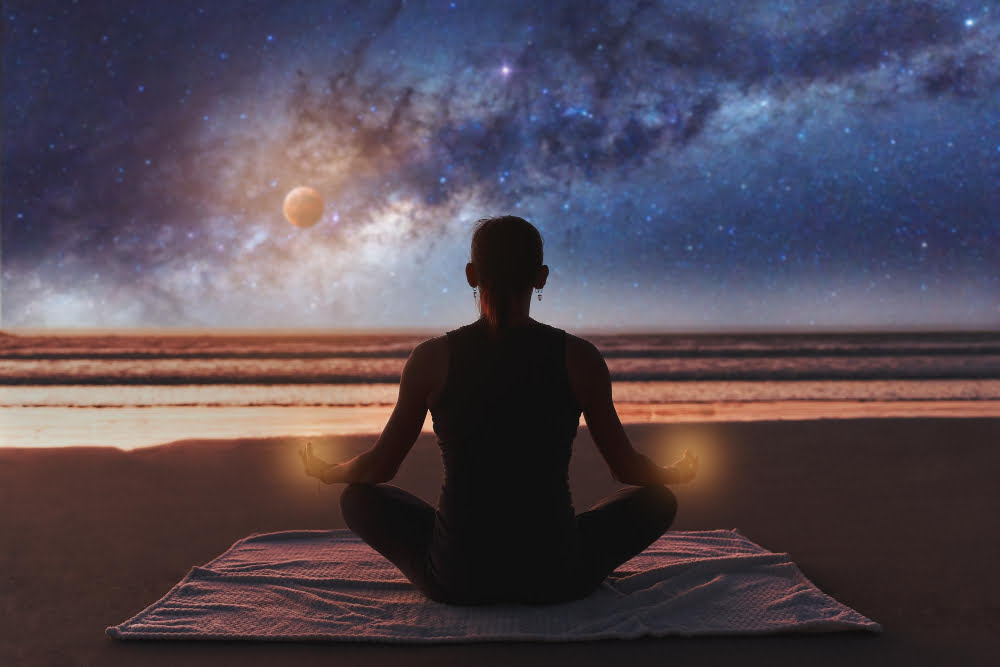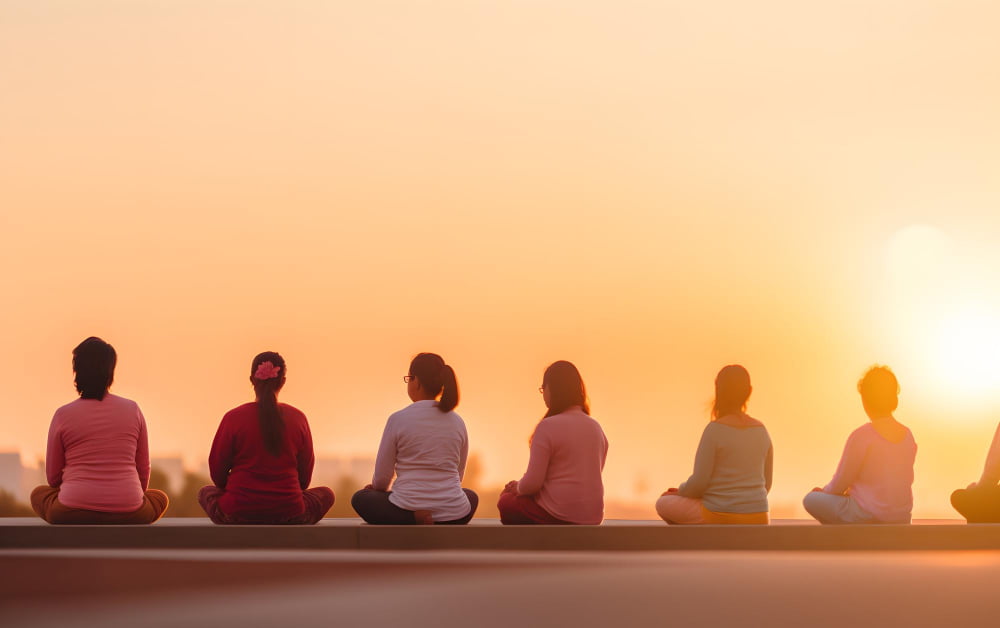Delving into the heart of meditation, this article uncovers whether mornings or nights rule supreme, because the timing can significantly impact your mindfulness journey.
Meditation, a practice of mindfulness and self-awareness, can be performed at any time of the day, but many wonder if morning or evening sessions yield better results. The truth is, both have their unique benefits, and the best time really depends on individual lifestyle and personal preference.
Morning meditation can set a peaceful tone for the day ahead, enhancing focus and positivity, while evening meditation can aid in unwinding and achieving a restful night’s sleep. This article delves into the pros and cons of both, helping you determine the ideal time for your meditation practice.
Key takeaways:
- Morning meditation enhances focus, positivity, and goal setting.
- Evening meditation aids in unwinding and achieving restful sleep.
- Morning meditation can be difficult for non-morning people.
- Night meditation promotes peace, gratitude, and better sleep.
- The best time for meditation depends on personal preference and lifestyle.
Benefits of Meditating in the Morning

Beginning the day with meditation can significantly perk up your mood, and here’s why. The quiet stillness of morning lends itself to achieving a meditative state more easily, setting a serene tone for the day ahead.
Moreover, cortisol, the body’s stress hormone, is naturally higher in the morning, so meditating then can help manage the body’s stress response throughout the day.
Additionally, a morning meditation can provide a clear stature for goal setting as well as better focus on tasks at hand, as such sessions tend to increase concentration levels.
Lastly, it’s an excellent way to prioritize your wellness routine and avoid the potential disruptions that come along as the day progresses.
Drawbacks of Morning Meditation

While early morning meditations are highly beneficial, they do come with a few potential downsides. The first challenge is overcoming the bed’s gravity and fully awakening yourself to focus on mindfulness practice. Several individuals grapple with this and may find their meditation session riddled with drowsiness.
Secondly, individuals with tight morning schedules may find squeezing in a meditation session stress-inducing, rather than calming. Apart from the daily rush of preparing for work or school, the mind can often be flooded with thoughts about the day’s itinerary, hampering a truly tranquil experience.
Lastly, not everyone is a morning person. For some, alertness peaks later in the day, making morning meditation difficult as it may coincide with their least productive time of day. People who thrive in the evening may not experience optimum mental clarity in the mornings.
Benefits of Meditating At Night

Taking a moment for self-reflection after a long day can bring peace and tranquility. Challenging daily encounters, stress, and anxiety can be resolved, allowing a smoother transition to peaceful slumber. Your mind is typically more quiet and clear at the end of the day as compared to the beginning. Consequently, this facilitates richer, deeper meditation sessions.
Further, mindfulness at the end of the day promotes gratitude and acceptance. You have the opportunity to ponder on the day’s events, relish the good moments, and release any negativity. This gratitude practice enhances overall contentment levels.
Lastly, nighttime meditation can help manage insomnia. By focusing on your breath and calming the mind, the body naturally prepares for a restful night’s sleep. Such mindful practice nurtures better sleep habits and improves sleep quality.
Drawbacks of Night Meditation

Night meditation, despite its numerous advantages, is not without challenges. The primary one is fatigue due to a long day at work or school, which may detract from one’s ability to maintain focus. Your mind, especially after a stressful day, could be filled with distractions, making it more challenging to concentrate during your session.
Another possible obstacle is insomnia. While some find night meditation aids in better sleep, others might find themselves so relaxed that it revs up their thinking process instead of slowing it down, leading to difficulty in sleeping.
Lastly, households also tend to be more active during the evenings, with family members might still be awake, leading to potential disruptions or noise. This, coupled with a sense of expectation or sensitivity to time owing to an impending bedtime routine, could make the practice less relaxing than it should be.
Is There a Best Time for Meditation?

Consider this: meditation is inherently flexible, designed to fit seamlessly into your daily routine, day or night. While some may find it easier to quiet the mind in the dawn’s early light, others may discover peaceful clarity beneath the stars. The key lies less in the ticking of the clock and more in the individual’s personal preferences and lifestyle.
To find your sweet spot, consider your daily rhythm. Are you naturally an early bird, revelling in the stillness of a sunrise, or do you find yourself a night owl, drinking in the tranquility of twilight?
Also, reflect on your daily demands. Jobs, responsibilities, and other commitments carve out specific chunks of time within your day. Determine which periods are consistently available, and use those as your anchor.
Finally, experiment. Give both morning and evening meditations a try. Gauge how each resonates with you. Your mind’s response will serve as the best guide in deciding your optimal meditation time. Bear in mind, consistency is vital, thus select a time you can adhere to regularly.
Comparing Morning Meditation Vs Night Meditation

To begin, consider that morning meditation helps you set a calm and focused tone for the day. It encourages a smooth transition from sleep to wakefulness and allows you to start the day with a clear and tranquil mind. Such practices often lead to increased productivity, decreased stress, and improved mood throughout the day.
On the flip side, night meditation serves as a soothing end to the day. A time to wind down, release the stresses of the day and prepare the mind and body for restorative sleep. By meditating at night, you can potentially enhance sleep quality, foster a deeper sense of peace and encourage positive dream states.
The deciding factor thus hinges on individual needs and lifestyle. For some, mornings provide the ideal quiet and solitude, while for others, evenings might offer the perfect break from the day’s hustle and bustle. Consider your daily routine, your energy levels at different times of the day, and how meditation fits in when choosing what suits you best.
The Interplay Between Meditation and Sleep Quality

Understanding the connection between meditation and sleep quality broadens an appreciation for the practice. Several studies validate the significant role meditation plays in ameliorating sleep conditions. Evening meditation, for instance, can help unwind the mind, reducing stress and anxiety, leading to a more peaceful slumber.
Mindfulness-based therapy for insomnia (MBTI), a structured program that combines mindfulness with traditional cognitive-behavioral therapy (CBT), greatly improves sleep satisfaction.
Similarly, morning meditation can set a positive tone for the day, increasing awareness and productivity. This lessens daytime stress and anxiety, which subsequently improves nighttime sleep.
Advanced meditators have also shown increased slow-wave sleep and REM sleep patterns indicating more restful sleep. Furthermore, regular practitioners often report less sleep requirement due to profound rest during meditation.
To maximize these benefits, consider consistency. Regularly meditating, either morning or evening, can improve your sleep patterns and overall quality of life.
FAQ
What is the best time to meditate?
The best time to meditate is usually in the morning, as it is often the time of day with the fewest distractions.
Is it OK to meditate right before bed?
Yes, it is beneficial to meditate before bed as it can promote overall calmness, potentially reducing insomnia and improving the quality of sleep.
Why you should meditate at night?
You should meditate at night as it offers a beneficial opportunity to decompress and relieve daily stresses, providing mental clarity and a peaceful outlook on the day’s occurrences.
Is it better to meditate right after waking up?
Yes, it is beneficial to meditate right after waking up as it can decrease grogginess and set the stage for a more productive day.
How does morning meditation affect your productivity throughout the day?
Morning meditation increases productivity throughout the day by boosting focus, reducing stress levels, and fostering a clear mindset.
What are the benefits of incorporating nighttime meditation into your routine?
Incorporating nighttime meditation into your routine can significantly improve your sleep quality, reduce stress and anxiety, boost your emotional health, and enhance your overall well-being.
Can the time of day significantly influence the overall effectiveness of your meditation practice?
Yes, the time of day can significantly influence the effectiveness of your meditation practice, with early mornings and evenings being considered the most conducive times for most people.